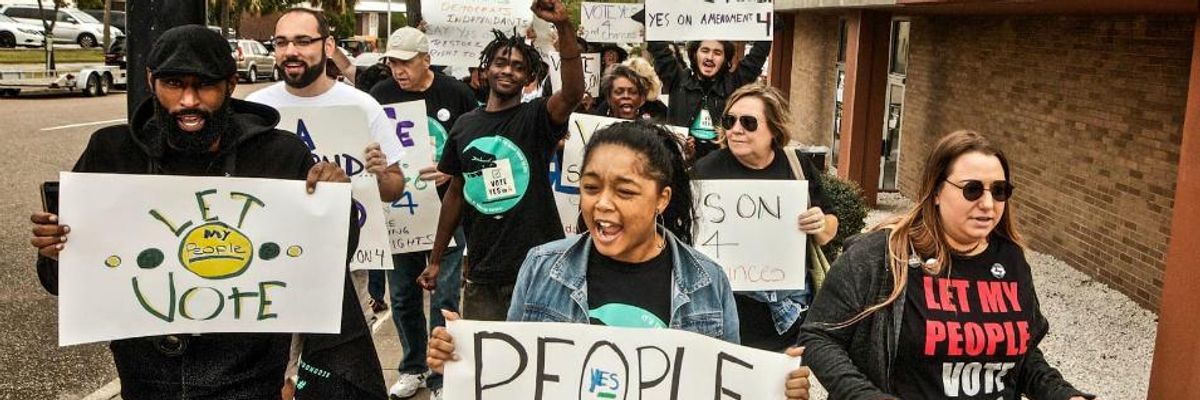Voting rights activists on Tuesday celebrated what the ACLU of Florida called "the single-biggest enfranchisement of voting rights since passage of the 26th Amendment to the U.S. Constitution" as an estimated 1.4 million people who completed felony sentences regained the right to vote--the result of a ballot measure victory in November that repealed "one of the country's worst Jim Crow laws."
Under the voter-approved amendment to the Florida constitution, ex-felons--or returning citizens, a term that some prefer--who reside in the state and have completed their sentence, including parole and probation, can register to vote either at their county's elections office or online at RegisterToVoteFlorida.gov. The restoration of voting rights does not extend to those convicted of murder or felony sex crimes.
In an op-ed for the Orlando Sentinel on Monday, Desmond Meade, president of the Florida Rights Restoration Coalition, which led the grassroots movement to get Amendment 4 on the ballot, reflected on his "front-row seat to witness a great moment in Florida's and America's history; a moment that everyone should reflect on and appreciate," and detailed plans to be "one of the first people at my local supervisor of elections office when their doors open in the morning," accompanied by his family.
Meade acknowledged his "joy and reverence" over his restored rights but also noted frustration that has followed the November victory, due largely to commentary by right-wing state officials, writing:
This is an historic moment so it is understandable that, along with great excitement, there has been a little confusion. However, when I register to vote, I will be doing so fully expecting every state officer, public servant, and citizen of Florida to abide by the rule of law and ensure that this new constitutional right is not infringed upon, and that the process of issuing my voter information card will not be hindered nor delayed.
Sharing Meade's piece on Twitter, Kristen Clarke, president and executive director of the Lawyers' Committee for Civil Rights Under Law, called Amendment 4 "a victory for democracy, one where all citizens deserve second chances and the right to vote."
Meade's op-ed came as organizers encouraged felons who are eligible to register as soon as they can, especially considering that last month, as Washington Post explained,
Gov.-elect Ron DeSantis (R) backed a delay so that lawmakers could consider how ex-felons' registration should be implemented. To many, the timing is suspect: The legislature does not convene until March, but municipal elections in Florida begin in February. All Democratic candidates running for statewide office in November endorsed the amendment. Republican candidates largely did not, including DeSantis and Gov. Rick Scott (R), who beat incumbent Bill Nelson (D) in the U.S. Senate race.
While no such delay has materialized yet, those who fought for Amendment 4--which was approved by nearly 65 percent of voters--insist that "the amendment was written to be self-executing," as Neil Volz, political director of the bipartisan Florida Rights Restoration Coalition, told the Post. Volz, who is now eligible to register in Florida's Lee County, added, "My supervisor of elections assured me that my registration form will be accepted."
As returning citizens fill out registrations, though, a report from The Intercept on Tuesday suggests the fight may not be over just yet.
Responding to a request for comment on confusion over Amendment 4's implementation in light of DeSantis' support for a delay, the Florida Department of State said in a statement that the amendment takes effect Tuesday, but that the department "will abide by any future direction from the Executive Clemency Board or the Florida Legislature regarding necessary action or implementing legislation to ensure full compliance with the law."
"They're trying to circumvent the will of the voter by put up all these roadblocks," Melba Pearson, deputy director of the ACLU of Florida, told the Wall Street Journal of Republican opposition to allowing the amendment to be implemented on Tuesday without additional legislation. Pearson also promised the legal advocacy group is prepared to go to court if election officials fail to comply with the measure.

